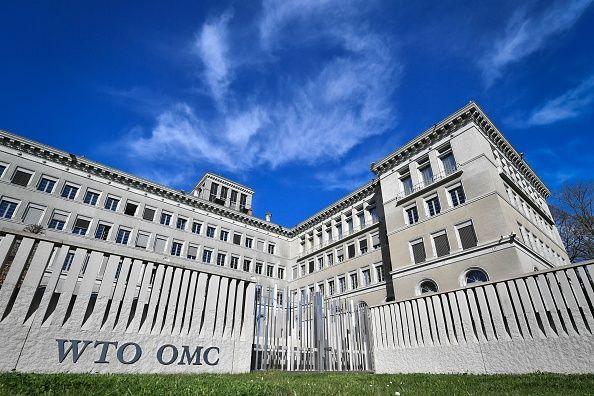There Are Perils To President Biden's WTO Waiver

The Biden administration wants to improve America's international reputation. That's why it endorsed a proposal before the World Trade Organization to waive all intellectual property rights related to COVID-19.
The president, no doubt, intends for this offer to be seen as a generous gesture that his "America First" predecessor would never have made. This isn't Trump's America, was the announcement's subtext.
Yet this endorsement is toothless virtue-signaling at best -- and dangerous economic capitulation at worst.
Remarkably by doing so, it caught our European allies by surprise. The EU nations, especially Germany, do not support the proposed waiver. Even the WTO did not fully agree with the original proposal which would have applied to a wide range of medical equipment and diagnostics.
The easiest way for America to boost its international standing is to serve as the world's "arsenal" of vaccines, to quote President Biden. His administration has already pledged to donate over 580 million of our surplus doses to developing countries, many of which are currently recording their highest COVID-19 case counts since the pandemic began. And the federal government has donated enough funding to global vaccination efforts to help developing countries purchase an additional 330 million doses.
These are impressive figures. But we could donate even more of our vaccine surplus. Nearly every American who wants to get vaccinated has been able to do so for months -- so there's little sense in stockpiling doses and letting them spoil.
Waiving IP rights, by contrast, won't boost vaccine supply -- for a number of legal and logistical reasons. All 164 WTO members have to agree for proposals to go into effect. A similar effort to deal with patents and the HIV epidemic was launched in 2001 and was not finally agreed to until 2017.
Even if the waiver does ultimately gain unanimous consent from major supply countries and the developing world, there are major obstacles that will prevent it from boosting supply.
First, most facilities that can produce vaccines are already doing so. The Serum Institute in India, the world's largest vaccine manufacturer, says it's on track to produce a billion doses this year. Aspen Pharmacare, South Africa's largest generics manufacturer, is on track to produce hundreds of millions of doses. Companies are also voluntarily licensing their therapies to the developing world.
Second, the supply bottleneck right now stems from a shortage of raw inputs, not IP protections. When a Guardian journalist asked the Serum Institute's CEO whether he agrees with the accusation that "the developers who hold the patents on the vaccines have licensed too few manufacturers to make them?" the chief executive flatly replied "No. There are enough manufacturers. It just takes time to scale up [production]."
Third, there are few scientists and engineers who fully understand the know-how behind mRNA vaccines. If the waiver were implemented, governments would have to work with the brand-name makers to transfer that know-how and possibly compel the transfer of their senior staff. All of those issues could take months, if not years, to resolve and would raise challenging legal issues in the U.S. and other countries.
Fourth, as the Delta variant spreads, the need for collaboration, not forced disinvestment, mounts. Companies that are already engaged in manufacturing vaccines are researching boosters. In recent epidemics -- HIV, Ebola, SARS and MERS -- the R&D conducted to address the crisis led to a surge in innovations. We need to support this virtuous cycle.
In other words, the waiver won't increase vaccine production, and certainly not in time to quell developing countries' COVID-19 outbreaks or new variants. But it could hand over leading-edge American technology to our competitors and cripple our ability to respond to future challenges.
There has been remarkable bipartisan concern about IP theft from China and other countries. These allegations include laws and regulations that are expressly designed to enrich Chinese industries at America's expense, and restrict the sharing of technical information -- including medical information -- with foreign entities. For example, according to USTR, any foreign company doing biotech research in China has to partner with a Chinese company and share all data, records, and ownership of the resulting technology.
In fact, Chinese positions on these issues have gotten worse in some cases. The U.S. requested that China improve its ability to provide early-stage IP protection for new biologics, such as vaccines, in the recent U.S.-China Phase 1 Agreement. China declined to do so in regulations released in early July.
It now appears that we would eliminate the risk of thievery by giving away the technology. It's staggering that the Biden administration would make it more likely that future medical breakthroughs come with a "Made in China" label. After all, mRNA has many potential uses beyond Covid-19. Scientists are already testing whether the technology could prevent cancer and HIV. We can ill afford to lose our current research and competition edge to countries that already dominate our supply chain.
IP rights are a proven element of that struggle for competition. For example, in the 1950s, the U.S. government forced RCA to give its patents royalty-free to its American competitors. Lacking a revenue stream from the domestic market, RCA licensed its technologies to Japanese companies who ultimately displaced U.S. firms.
Today, giving away IP rights risks more than economic competitiveness. It also risks the ability of the U.S. to respond safely and effectively to the pandemics of the future for all.
The U.S. needs policies that protect our innovative ecosystem and encourage collaboration with trusted partners to deliver vaccines, therapies, and global cooperation. Patents and technology transfer are part of the solution.
Debating about how to waive IP rights for vaccines could take years and benefit no one, while further crippling America's ability to respond to the public health challenges emerging even now.
Mark Cohen is Director of the Asia IP Project at the Berkeley Center for Law and Technology at the University of California, Berkeley





















